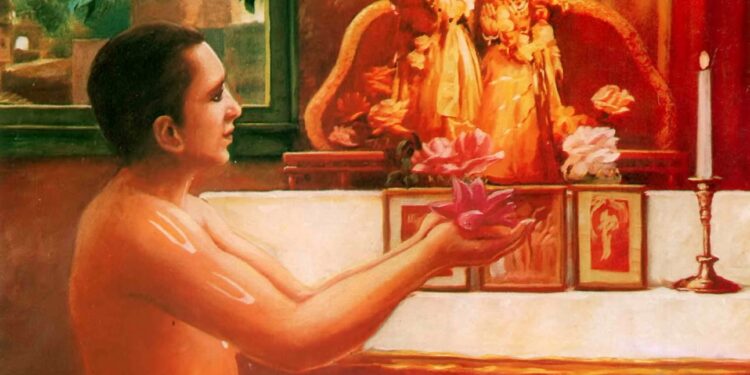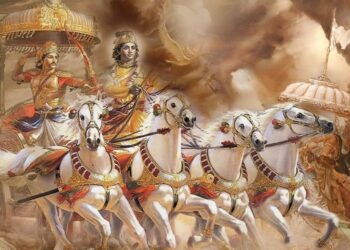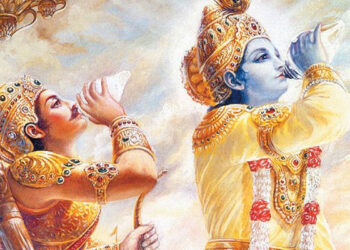Ten offenses while chanting the holy name
While chanting the holy name of the Lord, one should be careful to avoid ten offenses. From Sanat-kumāra it is understood that even if a person is a severe offender in many ways, he is freed from offensive life if he takes shelter of the Lord’s holy name. Indeed, even if a human being is no better than a two-legged animal, he will be liberated if he takes shelter of the holy name of the Lord. One should therefore be very careful not to commit offenses at the lotus feet of the Lord’s holy name. The offenses are described as follows:
- (a) to blaspheme a devotee, especially a devotee engaged in broadcasting the glories of the holy name,
- (b) to consider the name of Lord Śiva or any other demigod to be equally as powerful as the holy name of the Supreme Personality of Godhead (no one is equal to the Supreme Personality of Godhead, nor is anyone superior to Him),
- (c) to disobey the instructions of the spiritual master,
- (d) to blaspheme the Vedic literatures and literatures compiled in pursuance of the Vedic literatures,
- (e) to comment that the glories of the holy name of the Lord are exaggerated,
- (f) to interpret the holy name in a deviant way,
- (g) to commit sinful activities on the strength of chanting the holy name,
- (h) to compare the chanting of the holy name to pious activities,
- (i) to instruct the glories of the holy name to a person who has no understanding of the chanting of the holy name,
- (j) not to awaken in transcendental attachment for the chanting of the holy name, even after hearing all these scriptural injunctions.
There is no way to atone for any of these offenses. It is therefore recommended that an offender at the feet of the holy name continue to chant the holy name twenty-four hours a day. Constant chanting of the holy name will make one free of offenses, and then he will gradually be elevated to the transcendental platform on which he can chant the pure holy name and thus become a lover of the Supreme Personality of Godhead.
It is recommended that even if one commits offenses, one should continue chanting the holy name. In other words, the chanting of the holy name makes one offenseless. In the book Nāma-kaumudī it is recommended that if one is an offender at the lotus feet of a Vaiṣṇava, he should submit to that Vaiṣṇava and be excused; similarly, if one is an offender in chanting the holy name, he should submit to the holy name and thus be freed from his offenses. In this connection there is the following statement, spoken by Dakṣa to Lord Śiva: “I did not know the glories of your personality, and therefore I committed an offense at your lotus feet in the open assembly. You are so kind, however, that you did not accept my offense. Instead, when I was falling down because of accusing you, you saved me by your merciful glance. You are most great. Kindly excuse me and be satisfied with your own exalted qualities.”
One should be very humble and meek to offer one’s desires and chant prayers composed in glorification of the holy name, such as ayi mukta-kulair upāsya mānam and nivṛtta-tarṣair upagīyamānād [SB 10.1.4]. One should chant such prayers to become free from offenses at the lotus feet of the holy name.
also see: The Ten offenses to the holy name



















